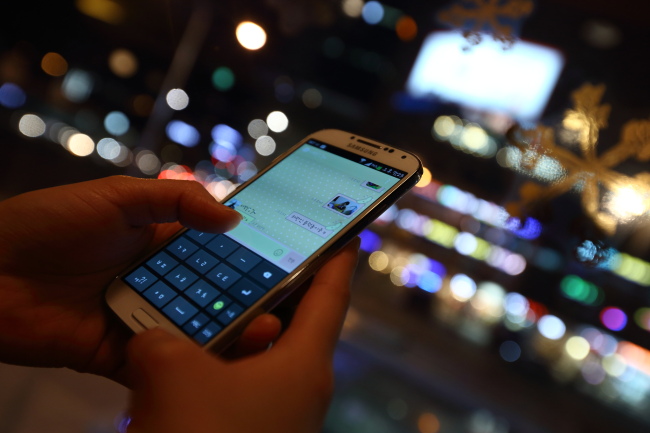It came as a stark reminder of the seriousness of the country’s smartphone addiction: A college student was killed on campus because she was distracted by her phone.
The 23-year-old student was run over by a shuttle bus on Korea University campus in 2011 while walking with her head down, eyes fixed and fingers tapping.
The tragic incident is just one of hundreds of traffic accidents here that occur every year because people have their eyes glued to their smartphones.
Korea’s pride in high-tech prowess, from ultrafast Internet to cutting-edge smart gadgets, is now being shadowed by deadly results of its high Internet dependence.
Korea University toughened safety regulations for shuttle buses on campus after the student’s death. But there were no warnings about using smartphones on the streets.
“Simply put, people place themselves in the same kind of danger because it’s a habit. Multitasking on smartphones outside can be very dangerous because it limits people’s ability to react to their surroundings,” said Kim Min-shik, a cognition and perception professor at Yonsei University.
Kim Kyung-hwan, a 30-year-old researcher, said he was almost hit by a car this year in Uiwang, Gyeonggi Province.
Kim was crossing the street while messaging his friend on Facebook, without noticing that the traffic light had turned red.
“It’s just a habit. I unconsciously check Facebook or articles when walking. I still check my phone on the street even after experiencing what almost got me killed,” Kim said.
The problem is not exclusive to digital natives.
As of September last year, the country’s smartphone penetration rate surpassed the 37 million mark, about 73 percent of the total population. The figure is the highest penetration rate in the world, according to the market research firm eMarket.
Among the users, about 21.7 percent have nearly gotten into a serious car accident because of smartphone use, according to the Hyundai Marine and Fire Insurance Co.’s research arm.
The number of traffic accidents caused by people being distracted by their smartphones here also doubled from 437 cases in 2009 to 848 cases in 2012.
“Millions of smartphone users are walking like a ‘moving bomb,’ but with little awareness of the danger,” Lee Soo-il, a researcher at the center, noted.
Between 2009 and 2012, the country made a quantum leap in the global smartphone race, helping to build up its tech-savvy reputation.
The timeline also coincides with when the number of smartphone subscribers in Korea jumped from 1 percent to 63.5 percent, according to the Korea Communications Commission.
The nation now touts over 48 million wireless Internet connections ― a figure that represents around 90 percent of its total mobile connections base.
“Seoul is often referred to as the ‘most-wired city’ in the world. Connecting to the Internet in Korea is easy anywhere at anytime,” said Park Eugene, a manager at DigiEco, a research arm of KT.
“As more people are using smart devices as a primary platform for accessing the Internet, the potential danger of smartphone-based accidents will only grow every year,” Park said.
About 42 percent of smartphone use in Korea is to search and text friends; 34 percent to make phone calls; and 16.7 percent to listen to music, according to the HMFI study.
The problem with such mobile services is that it is not really designed to be used while users are mobile ― though it is difficult to resist when free Wi-Fi services in public facilities are widely available.
All three major telecommunication firms ― KT, SKT and LG U+ ― offer free Wi-Fi on the street, at bus terminals, airports, in buses, KTX trains and even subways.
“It surprises me every time I see motorcycle messengers having several smartphones affixed to their dashboards, or when everyone sitting in the same row in a subway train is blankly staring and scrolling down on their smartphones,” said Baek Ji-won, who works in marketing for a local carrier.
“I feel threatened by people unconsciously checking their smartphones in dangerous situations. I also feel threatened because I often feel isolated and lonely, being the only one not staring at the screen among the crowed,” Baek said.
By Suk Gee-hyun (
monicasuk@heraldcorp.com)
Jeong Hunny and Suh Yeseul contributed to this report. ― Ed.






![[Herald Interview] 'Trump will use tariffs as first line of defense for American manufacturing'](http://res.heraldm.com/phpwas/restmb_idxmake.php?idx=644&simg=/content/image/2024/11/26/20241126050017_0.jpg)
![[Exclusive] Hyundai Mobis eyes closer ties with BYD](http://res.heraldm.com/phpwas/restmb_idxmake.php?idx=644&simg=/content/image/2024/11/25/20241125050044_0.jpg)
![[Herald Review] 'Gangnam B-Side' combines social realism with masterful suspense, performance](http://res.heraldm.com/phpwas/restmb_idxmake.php?idx=644&simg=/content/image/2024/11/25/20241125050072_0.jpg)